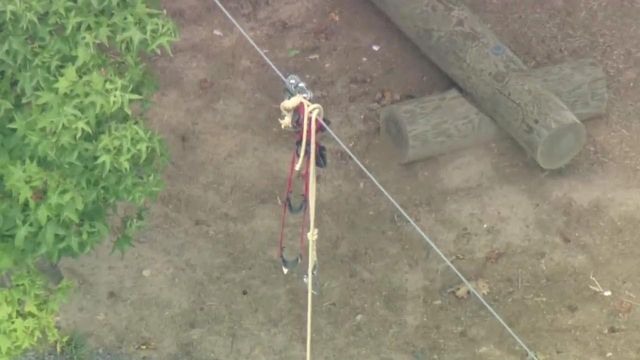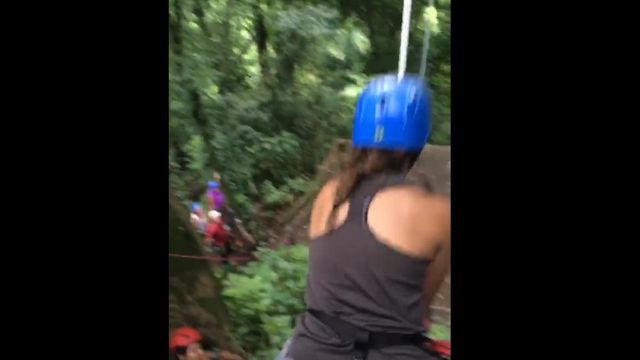NC zip line industry lacks state inspections, regulations despite deaths
Zip line rides are scattered across North Carolina, weaving through the mountains and stretching across the Triangle. But the popular attractions come with surprising danger: They're not regulated by North Carolina officials.
Posted — UpdatedZip line rides are scattered across North Carolina, weaving through the mountains and stretching across the Triangle and to the coast. VisitNC, the state's tourism website, claims North Carolina has more zip lines than anywhere in the East — Bond Park in Cary has one and so does Schenck Forest at North Carolina State University.
But the popular attractions come with surprising danger: They're not regulated by North Carolina officials.
Rides at the State Fair undergo state inspections each year. So do ski lifts, elevators and moving walkways at the airport. But zip lines and ropes courses don't get the same treatment.
After two children died while zip lining in North Carolina, though, families are pushing for greater oversight for the industry that currently has very little.
Zip line dangers
Sanders Burney, a 12-year-old girl, had just graduated from sixth grade in 2015 when she strapped into a zip line harness at Camp Cheerio, a YMCA camp in Alleghany County. Some lines got tangled after she took off, her harness snapped and she fell from the ride.
Burney died as a result of the fall.
Maria Comploier lost her son, Ozzie Vargas, to a zip line accident. He was 17 years old.
Vargas was at Camp Oak Hill in Granville County. His harness was attached at the back instead of the front so he could fly down the line like Superman. His harness broke, and he fell 50 feet to his death.
"The only thing I think about is I hope no other kids or no other parents have to experience the loss of a child," Comploier said. "It is extremely painful, and the pain never goes away."
Last year, Kathie Pagan got stuck on a zip line at Fayetteville's ZipQuest Waterfall and Treetop Adventure. She ended up dangling from her harness.
"It was cutting off the circulation," Pagan said. "I was in so much pain ... I couldn't think straight."
Pagan admitted she was taught a self-rescue maneuver by instructors before taking off, but she struggled to use it properly when she got stuck. ZipQuest called 911. It took two hours to get her down safely.
"I understand you're taking your own risks when you're zip lining through trees — anything can happen," Pagan said. "But what I didn't think would happen is their inability to rescue me."
In a statement, ZipQuest co-owner Russ C. Bryan said, "Our staff's training and safety protocols were underway, which included contacting emergency services as a precaution for some apparent medical concerns."
Bryan said they have "protocols to remove a guest from any part of the zip line course. Our guest was checked out by medical personnel on site and, as we understand, was uninjured.
"After over 7 years of operations and over approx 60,000 zippers, our attention to training, safety, top notch equipment, and course design, have paid off with no serious injuries at ZipQuest," he said.
Sanders' Law
A 2016 study by the North Carolina Department of Labor found zip lining accidents were "relatively rare."
The department ruled zip lining "should be considered a sport rather than an amusement" and for that reason "should not be regulated as an amusement device."
The department lists at least 15 states that have some form of "industry regulation," but most only require a so-called "paperwork inspection" — proof of staff training and inspections by a private, third-party company.
In North Carolina, inspections are self-regulated by the aerial adventure industry.
Sanders Burney's father told WRAL News he had no idea there wasn't any government oversight of the activity. Neither did N.C. Rep. Ted Davis Jr., Sanders' cousin.
"I don't know what we can do that'll absolutely prevent something from happening in the future. Accidents happen," said Davis, R-New Hanover.
Ken Jacquot, co-founder of the NC Aerial Association, said the group supports annual inspections and other safety measures, but that Sanders' proposal is "not a good bill for the industry."
"Many key requirements of HB196 are confusing, unrealistic, impossible to achieve and contradictory, which may actually create an environment of increased risk for participants," Jacquot wrote.
Should the bill become law, he wrote, "It is likely that many camps that offer zip lines will choose to no longer offer these activities."
The bill stalled in committee, but Comploier is hopeful it will come up again next session.
"Having seen two lives lost in North Carolina, I would encourage them to reconsider, taking this regulation seriously," Comploier said.
Ozzie and Sanders' parents say oversight in the industry is past due to make sure the thousands of people who clip in to zip lines and rope courses in the state are as safe as possible.
Web Extra: Zip Line FAQ *
A. One in a billion. Most accidents are human-error related. Check that guides are properly trained.
A. One type of braking is not necessarily better than the other, but you should definitely research the braking systems used on the tours you plan to visit. If you plan to go on a tour where the participant is required to actively control their own braking (as in the case of hand-braking), you should be comfortable with that responsibility. Likewise, you should research the other braking systems and ensure that you are comfortable with the systems in place.
A. You can research what standards the course is built to meet, as well as their process for training their guides. If you are in doubt, you can ask to see a copy of their inspection report and find out of they are fully insured.
A. That is a question that only your doctor can answer, depending on the physical requirements of the tour that you want to participate in. You should explain to your doctor what activities you will be involved in and she should decide.
A. Many canopy/zip line tour operators have a weight limit because it is the way they engineered their systems. They may also consider how well a participant can fit in a harness, and sometimes people above a certain weight may have trouble fitting in the harness according to the manufacturer of the harness recommendations. Many times the fact that operators do have a weight limit means they have done their homework and their systems are well engineered. And sometimes those that have no weight limit may very well have over-engineered their systems to fit any participant. Do inquire, do research.
(*from the Association for Challenge Course Technology)
Related Topics
• Credits
Copyright 2024 by Capitol Broadcasting Company. All rights reserved. This material may not be published, broadcast, rewritten or redistributed.






